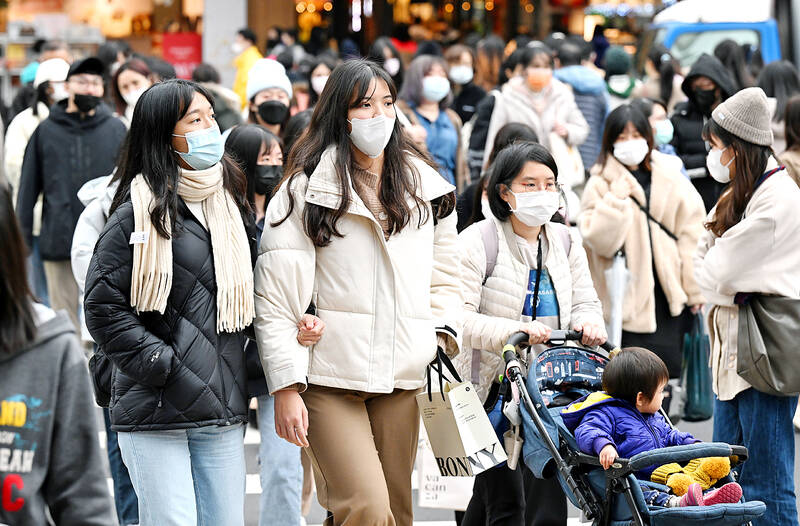COVID-19-related mask requirements could be further eased after the Lunar New Year holiday, the Central Epidemic Command Center (CECC) said yesterday, as it also reported that the Omicron BA.2.75 and BA.5 subvariants of SARS-CoV-2 have become the dominant strains circulating in Taiwan.
Centers for Disease Control (CDC) Director-General Chou Jih-haw (周志浩) reported 15,409 new local cases, about 9 percent down from the number reported on Monday last week, while new imported cases remain relatively high at 223, and 40 deaths from the disease were confirmed.
Deputy Minister of Health and Welfare Victor Wang (王必勝), who heads the center, said 151,838 new local cases were reported last week, which is a 15.7 percent decline compared with the previous week.

Photo: Liao Chen-huei, Taipei Times
The daily case trend suggests that Taiwan has passed the peak of its third wave of Omicron infections and new daily cases are dropping, but case numbers are expected to rebound after the Lunar New Year holiday, he said, adding that whether this would cause a “fourth wave” of infections is difficult to predict.
Wang said the center is planning to implement the second phase of mask mandate easing — which would only require masks in “high risk” indoor venues such as hospitals, long-term care facilities and public transportation — after the Lunar New Year holiday, if the COVID-19 situation remains stable.
The center also plans to downgrade COVID-19 as a category 4 notifiable communicable disease, he added.
Since the temporary arrival test requirement for travelers from China was implemented on Jan. 1, out of 22,057 China arrivals, 3,122 have tested positive, leading to a test positivity rate of 14.1 percent, Wang said, citing data as of Saturday.
CDC Deputy Director-General Chuang Jen-hsiang (莊人祥), who is the CECC spokesperson, said 224 people among 2,408 passengers who arrived from China on Saturday tested positive upon arrival, with a positivity rate of 9.3 percent.
Wang said the positivity rate has been decreasing, but the COVID-19 situation in China is still escalating and the virus is expected to spread from cities to rural areas during the Lunar New Year holiday.
Although new variants have not been detected among travelers from China, the testing program would continue until the end of the month, he said, adding that the center would assess whether it should be extended.
He said the genomic sequencing results on 157 virus samples from infected travelers from China showed that 61.8 percent were infected with the BA.5 strain, 36.9 percent with BF.7 and 1.3 percent with BQ.1.
Meanwhile, CDC Deputy Director-General Philip Lo (羅一鈞) said weekly genomic sequence surveillance data showed that the BA.2.75 subvariant has become a dominant strain, along with the current dominant BA.5 strain.
Of the sequenced imported cases — excluding travelers from China — last week, the BA.5 and BA.2.75 strains constituted 30 percent of the cases each, while the BQ.1 strain made up 20 percent and the XBB strain made up 13 percent, he said.
Of the sequenced local cases, 45 percent were infected with BA.5, followed by 41 percent infected with BA.2.75, Lo said, adding that the two subvariants are likely to constitute most local infections during the Lunar New Year holiday.
The XBB.1.5 subvariant has not yet been detected in Taiwan, Lo said.

Chinese Nationalist Party (KMT) Chairman Eric Chu (朱立倫), spokeswoman Yang Chih-yu (楊智伃) and Legislator Hsieh Lung-chieh (謝龍介) would be summoned by police for questioning for leading an illegal assembly on Thursday evening last week, Minister of the Interior Liu Shyh-fang (劉世芳) said today. The three KMT officials led an assembly outside the Taipei City Prosecutors’ Office, a restricted area where public assembly is not allowed, protesting the questioning of several KMT staff and searches of KMT headquarters and offices in a recall petition forgery case. Chu, Yang and Hsieh are all suspected of contravening the Assembly and Parade Act (集會遊行法) by holding

PRAISE: Japanese visitor Takashi Kubota said the Taiwanese temple architecture images showcased in the AI Art Gallery were the most impressive displays he saw Taiwan does not have an official pavilion at the World Expo in Osaka, Japan, because of its diplomatic predicament, but the government-backed Tech World pavilion is drawing interest with its unique recreations of works by Taiwanese artists. The pavilion features an artificial intelligence (AI)-based art gallery showcasing works of famous Taiwanese artists from the Japanese colonial period using innovative technologies. Among its main simulated displays are Eastern gouache paintings by Chen Chin (陳進), Lin Yu-shan (林玉山) and Kuo Hsueh-hu (郭雪湖), who were the three young Taiwanese painters selected for the East Asian Painting exhibition in 1927. Gouache is a water-based

Taiwan would welcome the return of Honduras as a diplomatic ally if its next president decides to make such a move, Minister of Foreign Affairs Lin Chia-lung (林佳龍) said yesterday. “Of course, we would welcome Honduras if they want to restore diplomatic ties with Taiwan after their elections,” Lin said at a meeting of the legislature’s Foreign Affairs and National Defense Committee, when asked to comment on statements made by two of the three Honduran presidential candidates during the presidential campaign in the Central American country. Taiwan is paying close attention to the region as a whole in the wake of a

OFF-TARGET: More than 30,000 participants were expected to take part in the Games next month, but only 6,550 foreign and 19,400 Taiwanese athletes have registered Taipei city councilors yesterday blasted the organizers of next month’s World Masters Games over sudden timetable and venue changes, which they said have caused thousands of participants to back out of the international sporting event, among other organizational issues. They also cited visa delays and political interference by China as reasons many foreign athletes are requesting refunds for the event, to be held from May 17 to 30. Jointly organized by the Taipei and New Taipei City governments, the games have been rocked by numerous controversies since preparations began in 2020. Taipei City Councilor Lin Yen-feng (林延鳳) said yesterday that new measures by